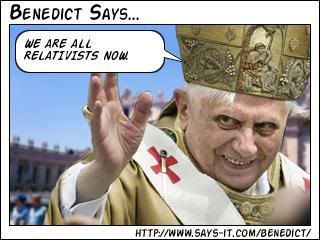Bleg: How influential is the Christian Right in Australia?
Homophobe and Australian Christian Lobby spokesman Jim Wallace has come out in support of the Federal Government's decision to overturn the ACT's civil union laws, boasting "We do not believe that such a minority of the population should be able to force their world view of . . . how marriage should be structured (on the majority)." Two years ago, he issued the following press release:
The securing of the institution of marriage by the amendments to the Marriage Act has been a great victory for Christian values in the nation. However it has also been a real sign that the Church is arising from its long sleep in a very positive and active way.We've heard it all before, particularly the sickening "hate the sin, love the sinner" hypocrisy. But compared with the United States, Australians have long had an image of being laid-back to the point of apathy as far as their religiosity is concerned. (Remember Kevin "Bloody" Wilson's "Festival of Light?") How much is this changing, and to what extent is it shaping public and political life in this country?
There is no doubt that the weight of emails that flowed into the Parliament over the weekend before the decision by Government to go ahead with this, had a very timely and strategic effect. In the end it was the courage and commitment of people like Senator Guy Barnett carrying the initiative, of Kevin Andrews, John Anderson, Bob Baldwin, Peter Dutton, Kerry Bartlett, Alan Cadman, and Chris Pierce that carried the day, but your emails galvanised people and set the environment.
What we must do now is ensure that we keep up the pressure to see Christian values maintained and strengthened in the nation. In this we must keep ourselves focused on the real issues, the war, not the little battles along the way. Some will be disappointed that superannuation was allowed to flow on to homosexuals. I do not share this concern and in fact it is my desire that as Christians we not elevate this sin of homosexuality to some super level that God doesn't use in the considering our wanderings. We need to respond to the activism and determination to tear down Christian values so evident in the most high profile homosexual activists with equal commitment, but we should not allow this to cloud our responsibility to love homosexuals as people. Loving people includes wanting to see them cared for.
The amendments to the Act are not as water tight as we would have liked, but we believe that the context has been so clearly set in the debate, PM's announcement and the exclusion of overseas homosexual marriages, that it would be difficult for even the most activist of judges to mischievously interpret it. We will however remain vigilant.
In the meantime well done. This is evidence that the good fight can be won. That in the end those who oppose Christian values are well and truly in the minority and only have their disproportionate influence through the false perceptions they have been allowed to create because of our absence from the fight. They now know we are back!
Last year, the Religion Report (on ABC Radio National) had a segment on "Politics and the Australian Religious Right," in which they spoke to NSW Liberal Upper House Member and Opus Dei "Co-operator" David Clarke, who made the following observation about the place of religion in Australian politics:
I’m not seeking to drive anybody out through preselections, but I do believe it is the responsibility of Christians to involve themselves in public affairs, and the political process, and that’s something that I encourage. I see Australia as a Christian nation in the Western tradition, and I believe we have nothing to be ashamed of. I believe that Christian values are at the foundation of our nation and I encourage Christians of all denominations to join the political party of their choice.Finally, I've blogged about the Exclusive Brethren before, and there is some scuttlebutt, c/o the ACT Greens, regarding the sect's influence upon the Howard government's decision to quash the ACT civil union laws (see the Age article on Jim Wallace linked to earlier). (UPDATE: Green Senator Bob Brown will be introducing a motion for the Senate to investigate the group.)
So what are we looking at, here? As of the 2004 election we know there is a "Hillsong vote" in Western Sydney. We know that over 100 private schools teach intelligent design in their science classes, and that former Education Minister Brendan Nelson thought it would be a good idea if it was taught in the science classrooms of government schools, too, "if that's what parents wanted." We've recently witnessed the "Bibles in hospitals" debacle. Are we witnessing the rise of US Republican-style, "Janet-Jackson's-nipple-is-the-Number-of-the-Beast" religio-politics in Australia? Or is it too soon to tell?
UPDATE: Or is there another explanation entirely, as suggested by this Alternet article on Straussian neoconservatism?
According to Drury, Strauss had a "huge contempt" for secular democracy. Nazism, he believed, was a nihilistic reaction to the irreligious and liberal nature of the Weimar Republic. Among other neoconservatives, Irving Kristol has long argued for a much greater role for religion in the public sphere, even suggesting that the Founding Fathers of the American Republic made a major mistake by insisting on the separation of church and state. And why? Because Strauss viewed religion as absolutely essential in order to impose moral law on the masses who otherwise would be out of control.
At the same time, he stressed that religion was for the masses alone; the rulers need not be bound by it. Indeed, it would be absurd if they were, since the truths proclaimed by religion were "a pious fraud." As Ronald Bailey, science correspondent for Reason magazine points out, "Neoconservatives are pro-religion even though they themselves may not be believers."
"Secular society in their view is the worst possible thing,'' Drury says, because it leads to individualism, liberalism, and relativism, precisely those traits that may promote dissent that in turn could dangerously weaken society's ability to cope with external threats. Bailey argues that it is this firm belief in the political utility of religion as an "opiate of the masses" that helps explain why secular Jews like Kristol in 'Commentary' magazine and other neoconservative journals have allied themselves with the Christian Right and even taken on Darwin's theory of evolution.

















|